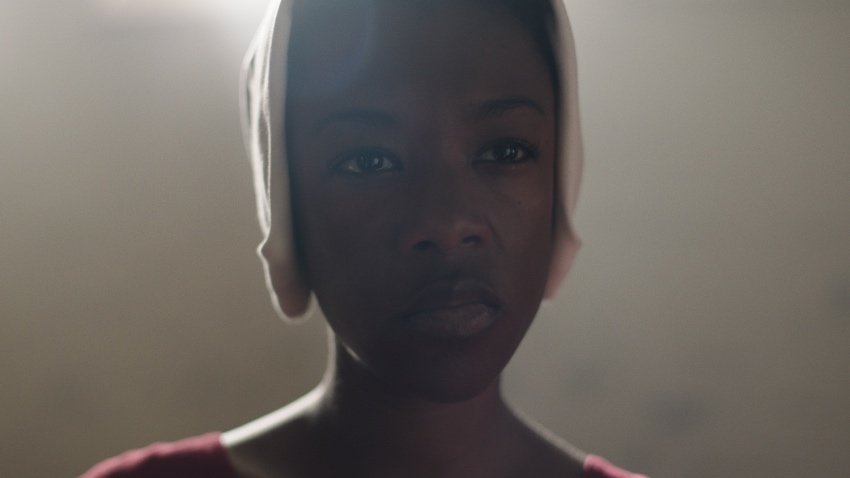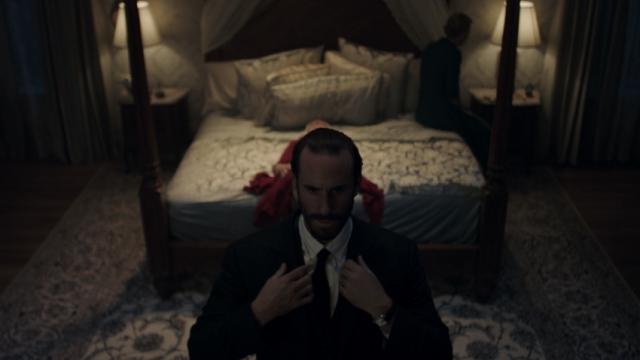The Handmaid’s Tale debuted on Hulu with its first three episodes, throwing the audience head-first into the Red Center for a hard education on life in Gilead. It’s largely effective, except for the moments it reminds us of that fact.
All Photos Courtesy Hulu
AU Editor’s Note: No Australian broadcaster or airdate for The Handmaid’s Tale has been announced. — Cam

The latest Hulu series, based on a book by Margaret Atwood, is undoubtedly one of the most anticipated shows of 2017. A good part of that is thanks to our current political climate, where conservative and religious-based ideology continues to butt heads with public policy. And even though the show was made before Donald Trump became president, it’s been interpreted by some as a direct middle finger to his overt sexism. Mostly, though, it’s a show about how female autonomy is feared by some, hated by others, and discriminated against by the privileged.
Our heroine, June (Elisabeth Moss), is now Offred, a handmaid for one of the leading commanders in Gilead’s theocracy. Her job is to give the Commander (Joseph Fiennes) and his wife a child, having proven she could bear children because she previously had a daughter. This is accomplished through The Ceremony, a supposedly sacred event that basically amounts to long shots of Offred getting awkwardly fucked on a bed while no one makes eye contact with each other.
You see, Gilead — formerly the United States of America — is a religious society that thrives on ritual and tradition, but the ceremonies themselves are typically better in theory than in practice. This is especially shown during the Birthing Ceremony in the second episode, which we’ll get to in a bit.
In the first episode, we’re introduced to Offred and given some insight into her current situation. Some of this happens through show-don’t-tell, like when Offred first meets the Commander’s Wife, but much of the plot is conveyed through Offred’s voiceover. This only works if you haven’t read the book, and even then it fails to do its job. That’s because the show’s biggest strength lies in what we don’t know and are struggling to figure out for ourselves.
In the original book, Offred is the first-person POV (and an unreliable narrator), and the show does its best to recreate this. Unfortunately, presenting Offred’s inner monologue as a voiceover doesn’t work in a visual medium. Moss is a talented actor, and her best moments are when her big blue eyes tell us everything we need to know. I don’t need to be told that Offred thinks Ofglen is a “pious little shit” who might expose her, I already knows that’s what she’s worried about. It’s written all over her face.
But it turns out, Ofglen (Alexis Bledel) isn’t a pious little shit after all: She’s a gay woman and, as we later find out, a spy for the rebellion. In the second episode, Ofglen tasks Offred with gathering intel about the commander, since he’s a high-ranking member of the government. This is helped by the fact that the commander has invited Offred to a private after-hours meeting in his office, something that’s supposed to be unthinkable in their society. All the commander wants to do is play a game of Scrabble, giving Offred a taste of the freedom she’d previously taken for granted, since women aren’t allowed to read or write in Gilead.
This interaction seems innocent on the surface — Offred interprets it as the commander needing human connection in a world deprived of true intimacy. But, like everything else in their world, it stinks of patriarchy. The commander doesn’t want to connect, he wants to control. The purpose of everything in this society is to control female sexuality. That’s why they started the coup in the first place. Throughout the first few episodes, we see snippets of how women’s rights were stripped away in the United States at the hands of this theological army. This was supposedly done to protect women, since people were scared about the plummeting birth rate, but it crushed women under the guise of honouring them.
However, even through all the sexism and control, women connect with each other, and the show’s biggest strength is in how those relationships are cultivated. The best example so far is the Birthing Ceremony from the second episode. All the handmaids are present to witness the birth of a child, lending their voices in a cult-like chant for hours on end until it becomes a roar of female intimacy.
It’s contrasted with the weird birthing ceremony for the wife, where she spends hours experiencing phantom contractions before physically play-acting the labour alongside her handmaid’s actual labour. The whole ceremony is designed to remind the handmaids of their purpose and keep them in line, but as I stated before, it’s better in theory than in practice. The energy the women experience with each other seems to circumvent that patriarchal intimidation. They gossip, they make sex jokes. They even manage to spike the punch.
Sadly, those victories tend to be short-lived, small moments of triumph amidst countless instances of grief. By the end of the third episode, Offred has crushed Serena Joy’s hopes of being pregnant, leading to her being locked in her room as punishment. Elsewhere, Ofglen was caught having an affair with another woman and sentenced to “redemption,” which is code for having to watch her lover die, followed by female circumcision. Ofglen has emerged as the strongest character in the show so far, a tragic hero who gained hope (and perhaps a little cockiness) after learning Offred was on her side, only to see her livelihood destroyed for following her heart.
It makes sense that Hulu released the first three episodes of The Handmaid’s Tale at the same time, because they’re designed to be watched together. They weave a complex tapestry about a world that’s based on familiar ideas, but unfamiliar executions. A lot has been said about how relevant the story is, how “this could happen to us.” In some ways, this is true… which is why elements like the voiceover really muck things up. The Handmaid’s Tale is best when it sits back and lets its audience figure out what’s going on and how they would feel if they were in that situation. Ten bucks says it’s how Offred is feeling too.

Assorted Musings
- One of my biggest beefs with the show is the timeline, and I sadly don’t see it improving anytime soon. As of now, it doesn’t make a lot of sense. June is surprised by the theological army kicking her out of her office, and doesn’t recognise the phrase “Under His Eye,” even though they’d already taken over the government and instilled martial law. So, either the coup happened everywhere instantly, including in the public and private sectors, or this is a world where people don’t use their iPhones.
- I thought using “You Don’t Own Me” as the ending song in the first episode was a little hackneyed, but the final scenes in the second and third episode were great, and the song choices accompanied them perfectly.
- The hospital scene in episode two was one of the strongest so far, because it showed the country’s fear and uncertainty without over-explaining things. The scores of people praying outside for a miracle, the woman who tried to steal June’s baby out of desperation. It reminded me a bit of Children of Men, giving us a taste of the bigger world so we could fill in the blanks ourselves.
- That manager who fired all the women was a cowardly little shit.
- I didn’t get a chance to talk about Moira (Samira Wiley) this time, because so much happened in these episodes, but her character is worth exploring. She’s definitely a curious one. In the past, she was fiery and confrontational, but she was the one pushing June to surrender in the Red Center. It’s clear she’s got plans, and is biding her time so she can survive. I’m curious to see how she escapes, and whether she actually died, as the handmaids claimed.
